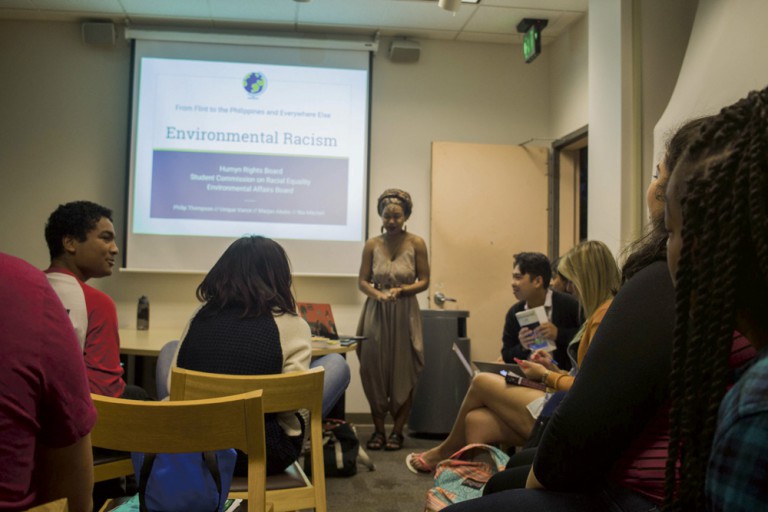
Madeleine Lee
Staff Reporter
Tucked away in a packed conference room of the MultiCultural Center, University of California, Santa Barbara’s student representatives from the Environmental Affairs Board, Student Commission on Racial Equality and Human Rights Board began the Mon., Feb. 8 discussion on environmental racism with the phrase: “From Flint to the Philippines and Everywhere Else.”
And by everywhere else they meant: Brazil, the Gaza Strip, Haiti, Fiji, New Orleans, Warren County, Flint, Downey and Porter Ranch.
To the forty-plus students and activists in attendance Monday night, the wayward list of countries and cities became a map of social and environmental battlegrounds as student lecturers Nia Mitchell, Unique Vance and Marjan Kris Abbubo pieced together the link between the methane gas leaks and lead-poisoned water of national headlines with the bloody history — and growing body count — of systemic racism.
As the disproportionate and inadequate distribution of environmental resources to groups of color, environmental racism, as second year history of public policy major Marjan Kris Abbubo pointed out, occurs on both a national and global scale.
“This is something that really hits home even when it’s thousands of miles away,” Abbubo said as he outlined the crises experienced by both his family in the Philippines — who now suffer from the aftermath of extreme weather and polluted waterways — as well as the impact of pollution on his grandmother, who lives in Downey, Calif. and is subject to the I-170 Corridor Project.
With the solemn words “My Neighborhood is Killing Me” glowing behind her, third year environmental studies major and EAB member Nia Mitchell continued the discussion with what she believes is the core of environmental injustice.
“Environmental racism is the system in which the government, capitalist society and white supremacy all band together to tell people, ‘You are a disposable body,’” Mitchell said. “This is exactly what they said in Flint when they chose to poison 100,000 people just so they could save a couple million dollars.”
In the heat of the Flint water crisis that has put the health of 100,000 citizens at risk, the majority of which are black, impoverished and unemployed, first year pre-bio major Bianca Shabaaz expressed her outrage at both the disaster and the collective response.
“People ask, ‘Why don’t they just move?’” Shabaaz said. “But they don’t move because they can’t. Moving is a privilege they can’t afford.”
As a member of a minority group on campus, second year history of public policy major Mariel Islas of the Undocumented Student Coalition also empathized with those in the heat of the struggle.
“People need an ID to have access to the clean water they’re giving out,” Islas said, “which makes clean water completely inaccessible to the undocumented because they can’t get IDs. They’re also probably too afraid to approach government officials in case they get reported. They can’t move because it’s so hard to find work in the first place. It’s a really terrible situation to be in.”
In the wake of injustice, however, EAB, SCORE and the Human Rights Board offer ways in which students can become agents of change, pointing to the courses Black Studies 154 and Environmental Studies 134CJ for anyone interested in delving further into the topic. The three student lecturers are also involved, along with Associated Students Senate, in implementing an environmental justice minor available to students within the next couple years.
“It’s important to remember that the environmental crisis that affects our globe,” Mitchell said to conclude the night, “is the exploitation of both the land and the people. We have a responsibility to affect positive change on both.”










